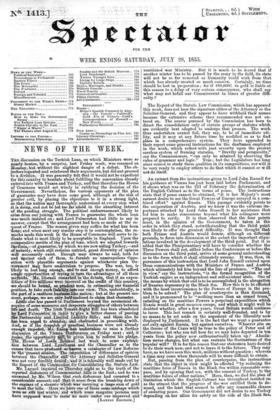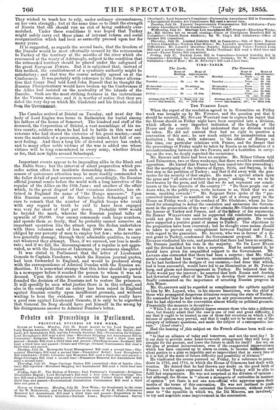An extract from the instructions given to Lord John Russell
for his guidance at Vienna has just been laid before Parliament, and it shows what was on the 22d of February the determination of the English Cabinet as to the terms of peace. The instructions state that if peace cannot be obtained, "it is her Majesty's most earnest desire to see the Great Powers of Europe arrayed in a com- bined effort" against Russia. This passage evidently points to the cooperation of Austria, and we know it was the extreme im- portance attached by Lord John Russell to her assistance that led him to make concessions beyond what his colleagues were prepared to ratify. It is then observed that the four points must, in the opinion of the Government, be taken in the order in which they stand, notwithstanding that the third punt was likely to offer the greatest` diffionity. It was thought that both France and Austria would demur, although on different grounds,'to force into discussion at the outset the important stipti= lotions involved it[ the development of the third point. But it is added that the Plenipotentiary will have to consider whether the Three Powers shall not, either before the Conferences or before the discussion on the third point, arrive at some general understanding as to the form which it shall ultimately assume. It was, then, in pursuance of this instruction that Lord John Russell entered upon those communications with the Ministers of France and Austria which ultimately led him beyond the line of prudence. ' "The end in view," say the instructions, "is the formal recognition of the Turkish empire as an independent and self-existent state. One of the means by which that end is to be acoomplished is the abrogation of Russian supremacy in the Black Sea. How this is to be effected with the least inconvenience to the Powers of Europe is the pro- blem to be solved." The plan of counterpoise is then discussed, and it is pronounced to be "nothing more than an armed truce," entailing on' the maritime Powers a perpetual expenditure which Russia would in great measure escape, and which it might well be doubted whether, after a few years, Great Britain would continue to incur. This last remark is certainly well-founded, and is by no means to.be -pet aside on- the argument of the liberality now displayed by parliament. _ It is the foot that we want a guarantee net puly:agithist liAtisia; but against ourselves. Whoever pits an the throne of. the Czars will be true to the policy of Peter and of 'Catherine; but who can tell how far we may have departed in ten. years frem the policy now enthusiastically taken up P Absolu- tism never changes, but what can restrain the fluctuations of the ipopularivill?-- It is for this reason that our statesmen have desired -to-..do their work now, and not to leave it to the future. They may have, as we hive seen this week, millions without question ; whereas atitne may come when thoimands.will be more difficult to obtain. _But,. passing from the plan of counterpoise, the instructions "state that the object in view might be effected. "by reducing the maritime foice of 'Russia in the Black Sea within reasonable com- pass, -Ind by opening that sea, with the consent of Turkey, to tko maritime forces of other nations." Here, then, we find the plan of limitation which- the English Cabinet has throughout insisted on as the utmost that the progress of the war entitled them to de- -bland, and the least that seemed to offer any reasonable chance Iof enduring peace. ' Our Government did not desire to see Turkey depending on her allies for safety on the side of the Black Sea.
They wished to teach her to rely, under ordinary circumstances, on her own strength; but at the same time so to limit the strength of Russia that she should run no risk of being suddenly over- matched. Under these conditions it was hoped that Turkey might safely carry out those plans of internal reform and social reorganization which had been so earnestly pressed upon her for many years.
It is suggested, as regards the second basis, that the freedom of the Danube would be most effectually secured by the retrocession to Turkey of the territory at the mouths of the river which she renounced at the treaty of Adrianople, subject to the condition that the retroceded territory should be placed under the safeguard of the great European Powers. But it is subjoined that, instead of this method, the establishment of a syndicate authority might be satisfactory; and that was the course actually agreed on at the Conferences. It was probably with reference to the former alterna- tive that Count Buol told Lord John Russell that he thought the Russian Plenipotentiary would have broken up the Conferences if the Allies had insisted on the neutrality of the islands of the Danube. Such are the most striking features in the instructions for the Vienna mission ; and it is worthy of notice that they are dated the very day on which Mr. Gladstone and his friends seceded from the Ctoyernment.



























 Previous page
Previous page